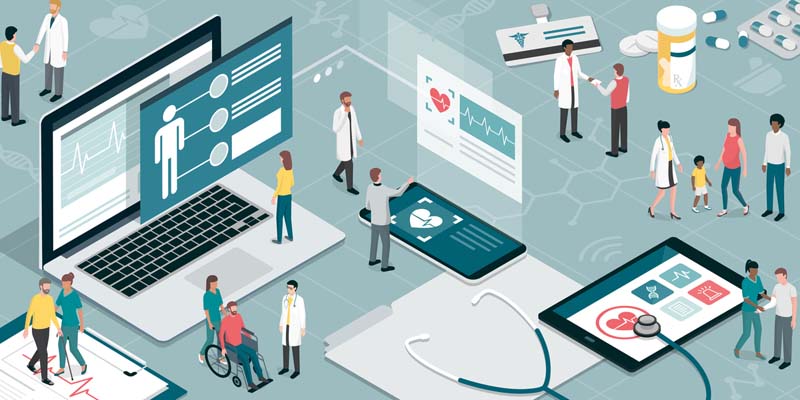
A health care provider company, for instance, can include a patient's data into a system that works with insurance agencies and almost automatically decide the patient's coverage for a particular procedure or medication. That is empowered by an API.
APIs have a major role to play in health IT interoperability in the years ahead, particularly as the data trade rules of the 21st Century Cures Act support their normalization and expansion across the healthcare ecosystem. APIs help healthcare suppliers enhance the functionality of electronic health records with the help of third-party programming for clinicians. With APIs, doctors can finally realize that all patient history is combined in one spot and is easy to access.
APIs like Eviti Web API empowers doctors to choose the most suitable treatment depends on a person's diagnosis and sort of medical coverage. APIs like DrChrono additionally assist doctors with charging patients and management.
Application programming interfaces empower data systems to communicate and move data among one another. Depending on how it is designed, an API can empower a system to send or recover data that can update a person's record or give aggregate information that can be utilized to make reports. An API additionally can send data starting with one system to the other.
Healthcare information is vast and growing. From clinical to cases to labs to radiology to social and behavioral, there are a bunch of information types that all help to make up the total patient record. Not to mention measured self data – the various sources of customer contributed information now available through wearables, smartphones, and the thriving number of connected gadgets in the Internet of Things. Access to this information is essential.
APIs can solve connectivity between systems by unmistakably defining transmission and security rules. A set of normal and open APIs will empower data to flow across systems and to be accessed across various locations. In a healthcare world where APIs are typical, clinicians, and patients themselves can have simple access to information, regardless of where it is stored. Even though concerns about protection and security are continuous obstructions to technological change in healthcare, APIs behave as an approach to concur and respect authentication conventions and guarantee control over who sees what data.
APIs can develop the healthcare ecosystem by permitting applications to share information with some other system and to use each other's capacities.
In addition to the fact that APIs present the possibility for internal advancement – where providers can build their own custom UIs for specific necessities – however, they empower third parties to get to data and abilities for explicit purposes. This means that data stored in an EHR is used for a more tailored application – either that serves a patient's purpose or empowers clinicians.
There are also advantages in increasing access to healthcare information to other healthcare verticals – such as scientists, pharma organizations, and medical tools companies. Scientists can engage in resident science by accessing anonymized data from a huge number of people and analyzing it to distinguish patterns; better comprehend reasons for conditions and results of treatments, and assess resource usage and expenses. Pharma organizations can access similar data to help with the advancement of clinical trials, to better comprehend the reported side effects and viability of specific medicines and treatments, and to screen adherence to then activity plans to limit wastage.
Ideal healthcare means serving the numerous permutations of a person's conditions, wellbeing, desires, and experiences. However, until now, the cost of making health applications frequently force answers to be generic to accomplish wide yet shallow coverage, and moderate the uptake of new advancements.
APIs can bring the level of innovation we've seen in different industries – like banking, travel, entertainment – to healthcare services. Individuals as of now working outside of healthcare will be persuaded to bring their skills, mastery, and experience to the area whenever given secure access to clinical and other data in a practical manner, making technologically progressed instruments of huge worth that serve not just the masses, but select groups too. Not only will APIs fast-track interoperability across healthcare companies, but they will empower smart and versatile applications that interface healthcare providers, health insurers, and other related parties with patients in new manners. This is more than making mobile applications. It's about using and connecting a range of specialist abilities, for example, risk prediction calculations, information visualization motors, payment providers, workflow engines, and proximity technologies.
To develop a healthcare environment that serves the delivery of ideal healthcare for each person challenges around interoperability and APIs must be handled head-on. Open APIs can, and will, revolutionize healthcare delivery through enabling patients and empowering cross-community coordinated effort between conventional healthcare providers and new players. Owing to the various benefits of healthcare API, it can be assumed that this market is going to flourish more in the next few years. The Global Healthcare API Market size is expected to rise at a market growth of 6.3% CAGR during the forecast period.